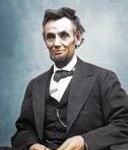 As I do research on Abraham Lincoln for a forthcoming book I periodically post reviews of some of the more interesting and relevant Lincoln scholarship. Which led me to this great book dating back to 1956 called Lincoln and the Tools of War by Robert V. Bruce.
As I do research on Abraham Lincoln for a forthcoming book I periodically post reviews of some of the more interesting and relevant Lincoln scholarship. Which led me to this great book dating back to 1956 called Lincoln and the Tools of War by Robert V. Bruce.
This is a fascinating book. Bruce has done an excellent job documenting Lincoln’s interest in new weaponry and the trials and tribulations of outfitting the Union troops and navy during the Civil War.
The book uses two main characters as counterweights to that of Abraham Lincoln in the seemingly never ending search for weapons that would help the North defeat the South. As the war came quickly, sufficient weapons were not available to outfit the hundreds of thousands of men who at first volunteered, and then were drafted, to fight. Captain (and later Admiral) Dahlgren ran the Washington Navy Yard and was often eager to test new guns, artillery, and “liquid fire.” At the same time, General Ripley was the foil, acting to slow the testing and implementation of new weapons. He ignored and turned away inventors who had discovered “the next best thing,” even as President Lincoln entertained and even took an active interest in testing and pushing the development of modern weapons to replace the old single shot muskets.
Bruce weaves an entertaining story as he documents what many don’t know, which is that Lincoln facilitated the process of replacing the muzzle-loading gun with breech-loading rifles. The breech-loading allowed speedier reloading with less danger and less jamming, while the rifling allowed greater distance and accuracy in firing. Lincoln helped get such guns as the “coffee mill gun” and other multishot guns that would eventually develop into what we know as “machine guns” into testing, and sometimes service. He entertained and facilitated many inventors in the White House for such things as rockets, steam guns, liquid fire, explosive bullets, and new cannons. There even was a balloon air force, a submarine and, of course, the “iron clad” ships.
I highly recommend the book to anyone interested in Lincoln, the Civil War, or weaponry in general. Unlike many books this old, it was published as a Civil War Book Club edition so readers should be able to find it easily and for a reasonable price in the usual online used book databases.
David J. Kent is currently working on a book about Abraham Lincoln’s interest in science and technology. He is also the author of Tesla: The Wizard of Electricity. You can order a signed copy directly from me, download the ebook at barnesandnoble.com, and find hard copies exclusively at Barnes and Noble bookstores.
Follow me by subscribing by email on the home page. And feel free to “Like” my Facebook author’s page and connect on LinkedIn. Share with your friends using the buttons below.










